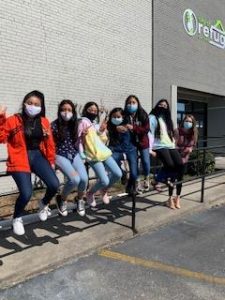“We have the opportunity to really shape how someone’s current situation is and how their future looks. And that’s a pretty amazing power.”
-Theresa Houck
Engage Diversity and Difference in Practice

As a professional social worker, I will engage diversity and difference in practice. I will utilize evidence-based research to recognize and understand how diversity and difference can distinguish the human experience and form one’s identity. I will use this information to become aware of my own biases as well as form an appropriate and effective helping relationship with clients. I will passionately strive to eradicate discrimination presented in any form through strategies such as advocacy.
PRACTICE BEHAVIORS:
2a: Develop and implement strategies that strive to eradicate discrimination in any form.
Academic Evidence: In the course Advanced Social Policy, I wrote a paper with my colleagues that included a literature review and media campaign which criticized (cognitive level: Evaluation) and passionately advocated to repeal HB8005 Tennessee Protest Law. Highlighted in the Policy and Advocacy Action Plan are issues surrounding racism, police brutality against protesters, and voter suppression. Through this Policy and Advocacy Action plan, I collaborated with my group in identifying strategies that strive to eradicate discrimination against protestors and voters. I demonstrated (cognitive level: analysis) the NASW core values of the importance of service, social justice, dignity and worth of a person, and competence.
Field Evidence: To develop and implement strategies that strive to eradicate any form of discrimination, I researched current immigration policies and the NASW’s 2021 Blueprint of Federal Social Policy Priorities which included strategized ways to eradicate discrimination. This is relevant to the population at the City of Refuge, as a large portion of clients identify as Latino and have experienced issues surrounding immigration in some form. After discussing these findings with my field supervisor, I completed a Sonia Monthly Field Journal for February. This task helped me better understand how to effectively advocate for clients experiencing issues as a result of immigration policies.
2b: Implement evidence-based and culturally-informed strategies with diverse populations.
Academic Evidence: In Advanced Clinical Practice I, I conducted CBT therapy with a client that identified as Native American. In segment II of my CBT Self-Assessment Paper, I discussed cultural issues that may become present when working with Native American clients. Using self- awareness and self-regulation I composed (cognitive level: synthesis) culturally informed strategies to navigate cultural issues when facilitating CBT therapy. I demonstrated the NASW value dignity and worth of a person, integrity, and competence.
Field Evidence: During my time with the City of Refuge, I was fortunate enough to assist with the Women’s Ministry which provided education and support to marginalized women in the community. The majority of the women in the ministry were Spanish speaking. Using self- awareness and self-regulation, I initially determined that I was uncomfortable attempting to communicate due to language barriers. I was fearful that I would offend the women while trying to genuinely communicate. After researching language barriers and its effects, I was able to overcome this uncomfortableness. I brainstormed and solved (cognitive level: application) issues surrounding the language barrier by strategizing ways to communicate. This was discussed in my Monthly Field Journal in March. In doing this, I demonstrated the NASW value dignity and worth of a person and importance of human relationships.
Other Evidence: I additionally attended (Affective level: receiving) a few Spanish lessons provided by the City of Refuge. This was documented in my Monthly Field Journal for October.